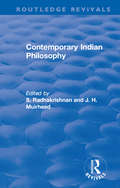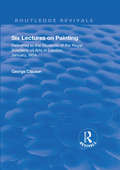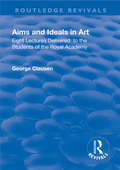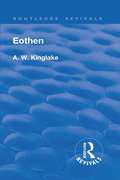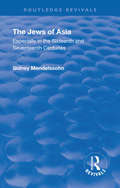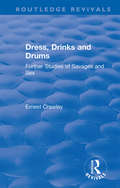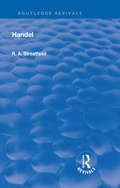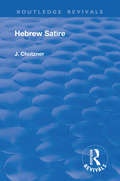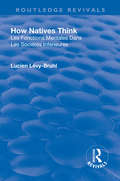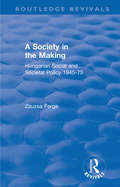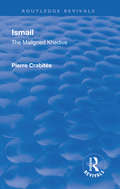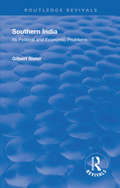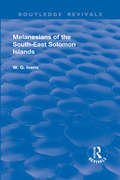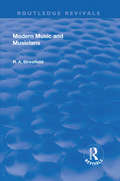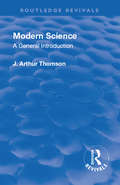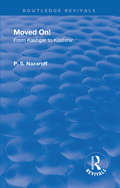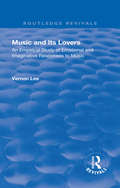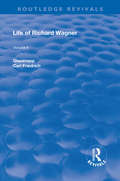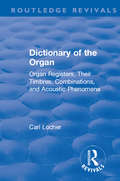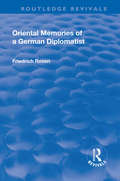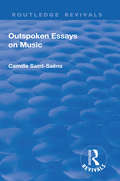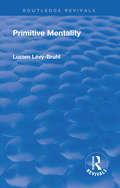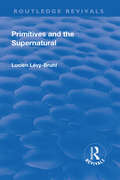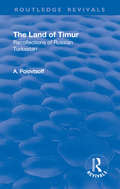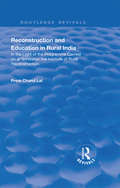- Table View
- List View
Revival: Contemporary Indian Philosophy (Routledge Revivals)
by S. RADHAKRISHNAN AND J. H. MUIRHEADThe book includes essay which are all written by philosophers of or about forty -five years of age. They fall into two main groups: those in which the writer devotes himself chiefly to the exposition of the great Vedic tradition as he has apprehended it and made it the basis of his own life’s work; and those in which the writer, while on the whole remining true to the spirit of that tradition, has sought to give new interpretations of it, either by instituting comparisons of it with the Western doctrines most closely allied to it or by treating of modern problems in a way which, though suggested by what he has learned from the West, is yet stamped with the mark of his own racial sympathy. Western readers will naturally find the latter group more attractive; but this volume will have failed of its purpose if it does not give them some sense of the truth that underlies even the essays with which, owing to the presuppositions ion which these are founded, they find themselves least in sympathy.
Revival: Delivered to the Students of the Royal Academy of Arts in London, January 1904 (Routledge Revivals)
by George ClausenThe chapters in this volume were delivered at lectures to students of the Royal Academy of Arts in January 1904 by George Clausen, who was at that time Professor of Painting. He approaches the subject a number of ways, including specific masters, styles, methods, techniques, contexts and composition. The book offers a balanced introduction to the subject, and to the modern reader, an insightful glimpse at an approach to this evergreen topic as delivered over 100 years ago.
Revival: Eight lectures delivered to the students of the Royal Academy (Routledge Revivals)
by George ClausenGeorge Clausen delivers these eight lectures to the students of The Royal Academy of Arts about the aims and ideals of art. He includes the truth to nature and style within art and explores the imagination and taste in drawing and using colour.
Revival: Eothen (Routledge Revivals)
by Alexander William Kinglake Henry Romilly Fedden1948 edition of this popular work, first published in 1844. It presents an entertaining account of the author's Eastern travels. Ostensibly with a view to providing a suggested outline of a tour to the interested reader, the book's portrayal of the internal journey one takes when travelling is as important an aspect of the book's value as is the historical interest it provides.
Revival: Especially in the Sixteenth and Seventeenth Centuries (Routledge Revivals)
by Sidney MendelssohnThe present publication is the first that has attempted to portray the separate and progressive history of the Jews in the different countries which they have made their homes, since their expulsion from the land which they had been identified for something like thirty centuries. In these pages the author has endeavoured to compile a narrative of a great part of what has occurred to the Jews of Asia in the last eighteen and a half centuries.
Revival: Further Studies of Savages and Sex (Routledge Revivals)
by Ernest Crawley'Studies of Savages and Sex' are brought together by nine shorter essays. In the present Volume are assembled three longer studies, the first of which, indeed, is long and important enough to have made a volume itself. It speaks of the origins, forms and psychology of dress (with special emphasis on the sexual psychology). The psychology of drinks and drums and all three combined.
Revival: Handel (Routledge Revivals)
by Richard Alexander StreatfieldIt is the inner meaning of Handel’s music, and its power of searching the profoundest recesses of the soul, that in the following pages I have endeavoured, so far as I am able, to elucidate. Its merely technical qualities have already been discussed enough and to spare. Books on Handel written by musicians already abound, but musicians as a rule take more interest in the means by which an end is attained than the end itself. They tell us a great deal about the methods by which a composer expresses himself, but very little about what he actually has to express. I have tried, how feebly and with what little success no one knows better than myself, to find the man Handel in his music, to trace his character, his view of life, his thoughts, feelings, and aspirations, as they are set forth in his works.
Revival: Hebrew Satire (1911) (Routledge Revivals)
by Joseph ChotznerVery little attention has hitherto been paid by authors generally to those works forming part of Hebrew literature, in which much of delightful satire is predominant. The object of this volume, therefore, is to make the reader familiar with the contents of several of these writings which may prove interesting to him.
Revival: How Natives Think (Routledge Revivals)
by Lucien Lévy-BruhlLevy-Bruhl speculates about what he posited as the two basic mind-sets of mankind; "primitive" and "Western." The primitive mind does not differentiate the supernatural from reality, but rather uses "mystical participation" to manipulate the world. Moreover, the primitive mind doesn't address contradictions. The Western mind, by contrast, uses speculation and logic. ‘How Natives Think’ IS an accurate and valuable contribution to anthropology.
Revival: Hungarian Social and Societal Policy, 1945-75 (Routledge Revivals)
by Zsuzsa FergeThis title was first published in 1979.
Revival: Ismail: The Maligned Khedive (Routledge Revivals)
by Pierre CrabitesThese pages challenge a historical heresy. They refuse to join in the chorus led by Milner, Colvin, and Cromer, and to agree that Ismail Pasha, the first Khedive of Egypt, was a spendthrift, a voluptuary, and a thief. Not even great names can stand up against facts and figures culled from official sources.
Revival: Its Political and Economic Problems (Routledge Revivals)
by Gilbert SlaterThis book deals firstly with the economic and social conditions of life among the villagers, the artisans, and other workers in cities and towns of South India, and also with the new issues raised in India during the most momentous years of its history since the mutiny – the commercial and financial disturbances following the war, the sudden appearance of aggressive Trade Unionism, the famines of 1918 and 1920, the rise of the Home Rule agitation and the Non-Co-operation movement, and the coming into operation of the new Constitution of 1919. The author, who went to India in 1915 as Professor of Indian Economics in the University of Madras, was quickly brought into contact with heads of departments of the Provincial Government, was nominated by Lord Willingdon to the Madras Legislative Council, served in the Indian Board of Agriculture, and stayed on for a year in charge of the Madras Publicity Office. In these and in other ways he has had exceptional opportunities of getting insight into Indian problems from an unusual point of view.
Revival: Melanesians of the South-East Solomon Islands (Routledge Revivals)
by Walter George IvensThis book discusses the Melanesians of the South East Solomon Island; including an introduction to the people, their social organisation, and religious beliefs.
Revival: Modern Music and Musicians (Routledge Revivals)
by Richard Alexander StreatfieldA plethora of biographical accounts of some of the contemporary composers and musicians at the turn of the twentieth century.
Revival: Modern Science (Routledge Revivals)
by J. Arthur ThomsonThe aim of this book is to give a general idea of the way in which Modern Science looks out on the world. By selecting a few salient illustrations, it seeks to show how the various sciences are disclosing the Order of Nature. It is hoped that it may be of service to the able minded reader who wishes an introduction of an informal type to the chief scientific problems of today. The book is meant to be suggestive as well as informative; and two characteristic features may be noted, for they are deliberate: the illustrations of scientific progress that have been selected are taken from all the great orders of facts – from astronomy to anthropology; and they deal not with easy things, but with the big problems that matter most.
Revival: Moved on! From Kashgar to Kashmir (Routledge Revivals)
by Pavel Stepanovich NazaroffPavel Nazaroff travels from Kashgar, through the Kuen Lun and Karakoram mountains and on to Srinagar, Kashmir in the early 1930s, and describes the people and places he visited.
Revival: Music and Its Lovers (Routledge Revivals)
by Vernon LeeAn empirical study of imaginative responses to music.
Revival: Opera and Drama (Routledge Revivals)
by Carl Friedrich GlasenappThe second volume of Carl Friedrich Glasenapp's Life of Richard Wagner.
Revival: Organ Registers, Their Timbres, Combinations, and Acoustic Phenomena (Routledge Revivals)
by Carl LocherA technical volume on the construction of organs. Comprises an alphabetically arranged detailing of the various components of organs, their characteristics and uses. Also includes a study of organ building.
Revival: Oriental Memories of a German Diplomatist (Routledge Revivals)
by Friedrich RosenHis Excellency Dr. Friedrich Rosen, the well known German Diplomatist and Orientalist, has written a fascinating account of his manifold experiences in the Near East, including Palestine, Syria, Persia and Mesopotamia, during a period of forty years. Many politically important or otherwise interesting mean and women, such as Ex-Emperor William II, Prince Bulow, Baron von Holstein, Sir Frank Lascelles, Sir Valentine Chirol, Lord Curzon and Miss Gertrude Bell, are spoken of in this volume.
Revival: Outspoken Essays on Music (Routledge Revivals)
by Camille Saint-SaensA series of essays on reactions and emotional responses to music.
Revival: Primitive Mentality (Routledge Revivals)
by Lucien Levy-BruhlThe primitive mind does not differentiate the supernatural from reality, but rather uses "mystical participation" to manipulate the world. According to Bruhl, moreover, the primitive mind doesn't address contradictions. The modern mind, by contrast, uses reflection and logic. Bruhl believed in a historical and evolutionary teleology leading from the primitive mind to the modern mind.
Revival: Primitives and the Supernatural (Routledge Revivals)
by Lucien Lecy-BruhlDr. Levy-Bruhl presents a dramatic picture of the primitives who live in a world that is capricious, unpredictable, and unstable; under the power of spirits both good and evil, to be worshipped or propitiated by ceremonies, dances, and religious rites. Dr. Levy-Bruhl shows how the mind of the primitive has no conception of the world of abstract though, natural law, causation, and categories, which has been opened up to the mind by science and philosophy. In addition, the author explains omens, talismans, amulets, ancestor worship, witchcraft, insect, defilement, and purification as fundamental parts of the primitive existence.
Revival: Recollections of Russian Turkestan (Routledge Revivals)
by Aleksandr PolovtsoffAlexander Alexandrovich Polovtsov recants his journey across central Asia with illustrations.
Revival: Reconstruction And Education In Rural India (1932) (Routledge Revivals)
by Prem Chand LalThis book explores the problems present in Bengal villages specifically, which represent problems found within the rest of rural India, therefore the same measures with very little modification could be employed in the work of rural reconstruction and rural education in those parts. The author discusses issues related to the government, as well as the caste system, and the social and religious customs, which he has argued not only hampered the path to progress, but reduced the people further and further to misery and despair.
